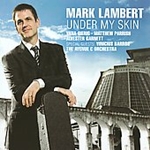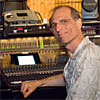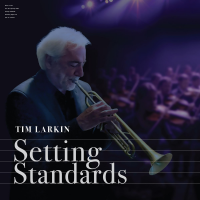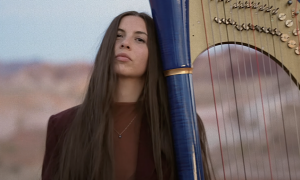Home » Jazz Articles » Interview » Barb Jungr: Smart, Sassy, Sexy
Barb Jungr: Smart, Sassy, Sexy
BJ: I don't know how else you could do it? You know when people say, "and Robert de Niro had to do this today," I go, "And? That is what you do." [Laurence] Olivier said, "It's called acting, dear boy." That story, you know, but you have to go there. If you're not going there, I don't quite know what you are doing, if you are doing this kind of work. It is an entirely different thing if you are doing something different. For example, I don't think Al Jarreau is doing the same thing; we're both singing but I think he is doing something different. He is operating musically in a different way. It is great and I love what he does and absolutely adore him and go to see him whenever he is on. But I don't think you go there for the same thing. There is room for everything. He is dramatic in his own way. Is it possible to do interesting stage work and not be dramatic? I suppose that would be my question. Because even if I take somebody like Eliza Carthy as an example, we can use all kinds of words like "stagecraft" and "presentation," but they are the same thing actually. They are all contributing to whatever the drama is of what you are doing. Sometimes people use the word "dramatic" as a pejorative, and I'm thinking of someone who is particularly critical of my work Sometimes people do that, "Oh, it is very dramatic" as a sort of brush-away, but Dylan is dramatic. Look at the way he presents himself. I think if you're doing your job on stage... All the people I've worked with recently here on stage, Mari Wilson, Claire Martin, Ian Shaw are all dramatic in their way. Christine Collister—my God! Each one fabulously dramatic and totally understands the parameters of performance. Sarah Jane Morris, The Bad Plus—all top level performers, I think—Guy Barker, Jamie Cullum, the same.
AAJ: What does it say on your passport?
BJ: I think it says "singer."
AAJ: Because your card says "singer writer," I notice.
BJ: I don't know why I did that. I think I was just being arsey. I do write, because I am writing The Fabulous Flutterbys [a children's story with music, to be staged at The Little Angel Puppet Theatre from May 2010] and I'm writing Mabel Stark [a musical theatre piece about a female tiger tamer] with Jonathan Cooper. Somebody said to me yesterday on [BBC Radio 4 programme] Woman's Hour I completely forgot that I've written kids' stuff before; I actually forgot my own life. That tells you a lot, doesn't it, really? It tells you all you need to know about what kind of person you're dealing with. I completely forgot that I'd written all of the music for three pantomimes. I completely forgot that I'd done the lyrics for Birmingham Stage Company's The Jungle Book. "Why are you doing children's theater?" "Because I just thought of it." I thought to myself today, "What? What were you thinking of?!" It is as if someone said to you, "Oh, and you can drive" and you went, "Yes, I know, isn't that amazing... Oh no, I've been driving for 25 years. What a surprise!" [Laughs] I can't believe that I'm such an idiot sometimes. Can't believe it.
AAJ: Over here [UK], you play jazz clubs, don't you?
BJ: Yes. The Vortex is pretty open-minded. I've played the 606 and Ronnie Scott's. I do the Dean Street Jazz Club and Boxford [Suffolk] and places like that. It is such a tricky thing this, isn't it—what is jazz?
AAJ: But over there [USA], you are "cabaret." Compare and contrast...
BJ: They're very different, they've got a different attitude. Over there, Frank Sinatra is cabaret; over there, Ella Fitzgerald is cabaret; anybody who plays at Vegas is cabaret. So, there is a different kind of understanding of the word, for a start. Over here, "cabaret" is often used pejoratively.
AAJ: Over there, do you only get into a jazz club if you're a horn player?
BJ: Not necessarily, actually. I like the places I have played. Um, but the whole "what is jazz?" thing is very interesting. My records are racked in jazz, that actually tells you exactly how categories are made. Categories are made for people to rack things in.
AAJ: But racking is other people defining you. How do you define you?
BJ: I would say that I was "singing." I actually think it is a real shame that there isn't just a thing that says "singers," "saxophones," "flutes" ... Because what is the real difference except repertoire between Oscar Peterson and Glenn Gould? They are piano players, they are playing the same instrument. Their repertoires are different. Then if it just about repertoire, what are we saying? That songs that actually came out of shows are jazz songs because that is the Great American Songbook; they were all written to be sung on Broadway in shows—that is what they were written for. So there is a very interesting thing that happens—with goalposts just swimming around according to how we want to use them. I don't really care anymore. What I care about for myself is that I try to get to as many people as I can, and I like as many people as possible to hear what I'm doing. That is what I like. But how you achieve that...you achieve it by every possible means. I don't think it is any more or less jazz than all sorts of other things that call themselves jazz but, in the final analysis...
AAJ: ... we are splitting hairs or dancing on the head of a pin.
BJ: It is tricky stuff. Simon maintains that it is difficult to call anything that has got vocals in it "jazz," and that jazz is actually instrumental music. That is a pretty good argument. Then you go, "Where would you put Al Jarreau in that?" There are always things that make you have to reframe it. And finally it is just terminology. It is problematic. Like my hygienist said to me, "I can't stand soul music." I went, "You're not talking about Marvin Gaye?" She went, "No, no. I'm not talking about Marvin Gaye. No." "What are you talking about then?" "You know, soul music." I can't remember who else I said, and she went, "Oh no, I don't mean them." And people often do that with jazz: "Oh, I can't stand jazz." And you'll go, "Do you like Billie Holliday?" And they'll go, "I like that." And you go, "A lot of people call that jazz." And they go, "Do they?"
AAJ: "Singer" is probably a good one to stick with, because then you avoid all of that.
BJ: It is, isn't it, because it's what you are doing, actually. I suppose it would be too much trouble in HMV—not that there are too many of them left these days.
AAJ: You probably achieve something when you are in "jazz vocals" because then you're all over the place, really.
BJ: What you want to be into is "Easy Listening," because who wants to be "Hard Listening?" Because those are the people that most people seem to know. Doris Day—easy listening. Great singer, Doris Day was a great singer. Dusty Springfield—easy listening. Great singer.
AAJ: It is the only place you'll find Sinatra, too.
BJ: That tells you something as well, doesn't it? I wonder whether those things will matter less and less as the shops go and everybody just shops online anyway. All you do is search online for it, and at that point it doesn't matter what it is categorized as; it is irrelevant.
AAJ: There is that catch-all category, "Beyond Category."
BJ: There is that, too. Where most things lie, I think.
AAJ: Increasingly in jazz, there is a huge melting pot in the middle, which is a lot of stuff.
BJ: Absolutely. You look at what is coming out of Sweden, all of that material that is coming out of Scandinavia. And the music coming out of places like South Africa. Those things that absolutely trash the boundaries.
AAJ: And the instrumentation—people's use of electronics now. It would have been outside of the big tent before. "You're not jazz if you use electronics." Increasingly, it's in there.
BJ: Yes. Totally. I totally agree.
AAJ: We've spoken about River, and you have touched on The Fabulous Flutterbys. What else is coming on down the line in your busy life?
BJ: Well, we think we are going to get a full commission on Mabel Stark Tiger Tamer, which is the story of Mabel Stark who was a female tiger tamer at the height of the American circus. Jonathan Cooper is writing the music; he and I collaborated when he did some work for me on the Elvis album, Love Me Tender (Linn Records, 2007) and I did some work for him on The Moon Behind the Clouds. We've been working together for years in this sort of swippy-swappy way, and then he came to me with this idea and we started working on it and we got commissioned by Greenwich, and then we've been commissioned by Royal and Derngate, Northampton and did a big workshop at the Scottish Academy of Music and Drama in November 2009 which was really fantastic. So I think we are going to go to full commission for that and hopefully a production in 2011. That is really exciting to me because Jonathan's music is fabulous. Difficult, but not in an arsey way. It is difficult in the sense that it is not simplistic, but it is melodic and it is really beautifully written. He is a beautiful composer and he is a great collaborator, because he is not easy because he is particular so between us we thrash a lot. That makes me have to work really hard. So, yes, we are working on that, and that's great. The hope is that I'll play the older Mabel in that, because there is an old Mabel and a young Mabel. And, much as I'd like to play the young Mabel, she has to be the Mabel who is 20 going into the ring... and even I thought that was going to be quite a leap for the audience [laughs]. So, that'll be next year, but that will be quite a lot of work this year, through the summer.
AAJ: I must say, I love your so-so hand gesture [used in concert to accompany the line "I'm young, I know" in "Love Hurts"]. That is so incredibly charming, honestly. I've seen you do it twice now, and it has given me a wry smile both times.
BJ: It's not as though people are idiots, they can tell. And also, I think, that at a certain point in your life you go, particularly as a performer, there is a rough area when you are too old to be Lady Gaga (if that were your intention) and you are not yet into your "dame" territory. It is sort of a no-person's land and quite a difficult area particularly for women, I would say. And then there's a place you get to, which I think I have come to really, where you have gone past that and you can go, "No. I really have been around the tree; you know I've been around the tree; I know I've been around the tree; we can take that as read. Therefore if I sing this, you know that I know what it means." Then people can go, "No. I get that" and they can be at any place in their lives and know that. Whereas I find it problematic if I go and see someone and I think, "You don't know what that means. I'm sorry, you've no idea what that means." You can't make that work then, you know. So, you can't kid an audience; they're not stupid. So that [gesture] tells them that I know that they know I know they know, and that they know that I know they know... Which is great. So we're all in the boat together.
AAJ: Yes. You are of an age but so is lots of the audience members. But you are an attractive and sexy woman, and you trade on that. You are electric on stage. You are; you know that, surely.
BJ: Well, you don't think about things like that.
AAJ: Would that be like thinking about walking upstairs, where you can't walk because you're thinking too much about it?
BJ: Absolutely, you can't think about that. Obviously, I think you do your best to present yourself in the best possible way. In that way, I don't think I was ever doing anything different. I don't like the slope on stage with your old trainers on—because I think if I've paid, the least you could do is to scrub up. It is the least you could do. I don't like it. I want people to have scrubbed up, whatever that means to them. I loved Amy Winehouse in concert recently; look at the amount of effort in that image; there is a lot of effort has gone into that. I might look as if it has just been knocked off in a dressing room, but it's not; a lot of thought and effort has gone into it. I'm really all for it.
AAJ: Onstage, it is not that you put on a persona. What is onstage is you, isn't it?
BJ: I think that is true of everyone.
AAJ: Amy Winehouse? There are people who almost put on a different persona when they go onstage.
BJ: I don't know. It came up yesterday on this Woman's Hour thing, with this whole thing of working on the alternative cabaret circuit. And I do think that was my training ground; I think I learned so much there. And everything that people did there...I count among people I work with and know some of the greats who are now on television. They are all people who you see something of them on stage. You may not see all of it, but there is not a huge difference; there is a real connecting thread between Paul Merton-funny on Have I Got News For You and "Paul Merton sat beside you in a pub after a Julian [Clary] gig." There is a direct line. It is not like, "My goodness. I would never have thought it." There is not that, and I think maybe that something that came from that was... I remember Ivor Dembina—who has taught a lot of young comics and is a really, really nice man—saying to me, very early on this was, when you go onstage don't do anything, just be yourself and tell people things. That was a real gift, what he said, because that is enough actually. Just go on there and tell people things—that is enough; you don't have to make a big effort. I think that whole thing which maybe is what you are talking about, if I think about it, is what I see a lot in America, this whole scripted-by-someone-else thing. I hate it. I don't want to hear that. I like it if I know the person has written it. I went to see Carrie Fisher's show, which is called Wishful Drinking and she is a great writer. She has obviously written her own text and it is her, and it is fantastic. The same with Elaine Stritch, it is her. You are getting her, you are not getting somebody else. Somebody else may have helped shape it, somebody else may have directed it but you are getting them. That is what I want if I'm watching somebody, I want them
AAJ: With you it seems that it is not scripted—obviously it isn't, you just take it as it comes. You talk about the people on the train the day before with a pit bull terrier and all of that. It is almost like a blog where people just tell you what has happened in their day.
BJ: But it is true. I don't say anything on stage that isn't true, that I haven't experienced or that someone has told me. It is a real part of life. I think that is what makes it interesting and relevant.
AAJ: It seems like what you would say to someone if you were chatting to them. "I was on the train..." and there it is. And you are doing it to an audience. It is almost like a conversation with them, except that they don't converse back.
BJ: Every so often, somebody does. I do get the odd person who'll heckle or communicate something. Which I think is quite courageous, actually.
AAJ: It'd be a brave person who'd heckle you, Barb. Good grief.
BJ: I have this marvelous friend who is Danish, and he can get slightly pissato. And one time, suddenly for no reason at all, he shouted something like "Blue Tuna" and the whole audience was completely nonplussed as indeed was I. I knew it was him. He was so thrilled with himself that he'd done this great heckle, afterwards he said sorry but just that he thought it was funny. I went, "I know. I know you did." I had to say to the audience, "It's a friend of mine. Don't worry about it. He's Danish." And they laughed, because of the "He's Danish."
Selected Discography
Barb Jungr, The Men I Love: The New American Songbook (Naim, 2010)
Barb Jungr/Christine Collister/Helen Watson/Michael Parker, Hell Bent Heaven Bound: Money The Final Frontier (Stereoscout, 2009)
Barb Jungr, Just Like a Woman: A Hymn to Nina (Linn, 2008)
Barb Jungr, Walking in the Sun (Linn, 2006)
Barb Jungr, Love Me Tender (Linn, 2005)
Barb Jungr, Waterloo Sunset (Linn, 2003)
Jonathan Cooper, The Moon Behind the Clouds (Self-produced, 2002)
Barb Jungr, Every Grain of Sand (Linn, 2002)
Barb Jungr, Chanson: The Space in Between (Linn, 2000)
Barb Jungr, Bare (Irregular Records, 1999)
Various, Ne me quitte pas: the songs of Jacques Brel (Irregular Records, 1998)
Tags
Barb Jungr
Interview
John Eyles
Bob Dylan
Bruce Springsteen
Ella Fitzgerald
Billie Holiday
Dinah Washington
Cole Porter
The Byrds
Rod Stewart
Percy Mayfield
Sonny Terry
Miles Davis
Sarah Vaughan
Al Jarreau
claire martin
ian shaw
The Bad Plus
Guy Barker
Jamie Cullum
Sinatra
oscar peterson
Doris Day
PREVIOUS / NEXT
Support All About Jazz
 All About Jazz has been a pillar of jazz since 1995, championing it as an art form and, more importantly, supporting the musicians who make it. Our enduring commitment has made "AAJ" one of the most culturally important websites of its kind, read by hundreds of thousands of fans, musicians and industry figures every month.
All About Jazz has been a pillar of jazz since 1995, championing it as an art form and, more importantly, supporting the musicians who make it. Our enduring commitment has made "AAJ" one of the most culturally important websites of its kind, read by hundreds of thousands of fans, musicians and industry figures every month.


























